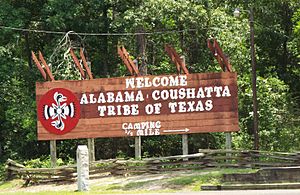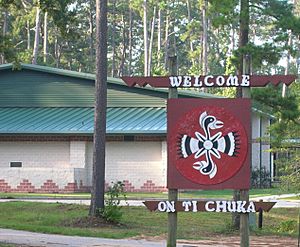Alabama–Coushatta Tribe of Texas facts for kids
Quick facts for kids
Alabama–Coushatta Tribe of Texas
Albaamaha-Kosaatihaha
Albaamoha-Kowassaatiha |
||
|---|---|---|
 |
||
|
||
| Country | United States | |
| State | Texas | |
| County | Polk | |
| Established | 1854 | |
| Government | ||
| • Type | Tribal council | |
| Area | ||
| • Total | 4,593.7 acre (1,859.0 ha) | |
| Population
(2020)
|
||
| • Total | 679 | |
| Time zone | UTC−5 (Central Time Zone) | |
| • Summer (DST) | UTC−4 (Central Daylight Time) | |
| Area code(s) | 936 | |
| Website | https://www.alabama-coushatta.com | |

The Alabama–Coushatta Tribe of Texas is a federally recognized tribe of Native American people. This means the United States government officially recognizes them as a sovereign nation. The tribe includes people from the Alabama and Koasati (Coushatta) groups. They live in Polk County, Texas.
Their traditional languages are Alabama (Albaamaha-Kosaatihaha) and Koasati (Albaamoha-Kowassaatiha). These languages are part of the Muskogean languages family. The Alabama and Koasati peoples are descendants of the historic Muscogee or Creek Confederacy. This was a large group of tribes from the Southeastern U.S., especially from Georgia and Alabama.
As of 2022, the tribe has over 1,200 members. About 589 of them live on the reservation in Texas. They are one of only three federally recognized tribes in Texas.
Contents
History of the Alabama–Coushatta Tribe
The Alabama and Coushatta peoples are part of eight federally recognized tribes whose ancestors came from the Muscogee Confederacy. Many Muscogee people were forced to leave their homes in the 1830s during the Trail of Tears. This was a difficult journey where they were moved to Oklahoma.
Migration to Texas
The ancestors of the Alabama–Coushatta Tribe faced pressure from European American settlers. They migrated from Alabama and the Southeast into Louisiana. Eventually, they moved to East Texas in the late 1700s, when Spain ruled the area. They settled in a place called Big Thicket. Here, they learned to live with the forest and water environment.
When more European Americans from the United States started settling in Texas, the tribes made friends with them. They traded goods and lived peacefully. Sam Houston, a famous Texas leader, helped protect them during conflicts with other Native American groups. After Texas joined the United States, more settlers arrived. The tribes asked the state to set aside land just for them.
Protecting Tribal Rights
Between the 1940s and 1960s, the U.S. government had a policy called "Indian termination." This policy aimed to end the special relationship between the federal government and many Native American tribes. On August 23, 1954, the government passed laws to end its federal ties with the Alabama–Coushatta Tribe. This meant the government would no longer be responsible for their lands. Instead, the land would be given to the State of Texas.
However, in 1983, the Texas Attorney General said that the state taking over the tribe's land was against the Texas Constitution. In response, a federal bill was introduced in 1985 to restore the tribe's federal recognition. This bill, called the Yselta del Sur Pueblo and Alabama and Coushatta Indian Tribes of Texas Restoration Act, was passed on August 18, 1987. It brought back the federal relationship with the tribe.
Alabama–Coushatta Reservation
The Alabama–Coushatta Reservation was created in 1854. The state of Texas bought about 1,110 acres of land for the Alabama people. Around 500 tribe members moved to this land in 1854–55. The state also planned to buy land for the Coushatta, but it never happened. So, the Coushatta began living with the Alabama people on their reservation.
Over time, the tribe acquired more land. Today, their reservation is 4,593.7 acres big. It is located about 17 miles east of Livingston, Texas, in the Big Thicket area.
Tribe Demographics
As of 2020, the reservation has a total population of 679 people. Most of the people, about 86.7%, are American Indian. The reservation has a young population, with 42.3% of people under 18 years old. Only 4.5% are over 65.
Economically, about 65.9% of the population is employed. The average household income is $49,219. About 17.2% of the people on the reservation live in poverty. Also, 38.5% of the population does not have internet at home. However, the homeownership rate on the reservation is high, at 74.9%.
Environment and Land Management
The tribe has its own wildland fire department. They also have a land management program. This program uses fire suppression tactics to manage the forests on their land. This work is very important for the longleaf pine trees. The tribe and their ancestors have used these trees for centuries to make baskets and build homes.
Sadly, 95% of longleaf pine forests have been lost in the region. Longleaf pines need fire to help their seeds grow. The Nature Conservancy helped the tribe buy equipment and get training for wildland management. Because of this, the tribe now manages over 200 acres of pine trees they planted in 2012. They also care for another 200 acres of older trees.
Tribal Government
The Alabama-Coushatta Tribe of Texas has its main office in Livingston, Texas. They are led by a tribal council. This council includes a Principal Chief and a Chief, who act as advisors. The tribal council members are elected. The council has a Chair, a Vice-Chair, and five other members. The tribe's rules, called their constitution and by-laws, were adopted on June 16, 1971.
As of 2022, the tribal leaders and council members are:
- Chief: Donnis B. Battise (Mikko Istimatokla)
- Council Chair: Rick Sylestine
- Council Vice-Chair: Nita Battise
- Council Secretary: Yolanda Poncho
- Council Treasurer: Ronnie Thomas
- Council Member: Roland Poncho
- Council Member: David Battise
- Council Member: Melanie Battise
The position of Principal Chief is currently empty. The last Principal Chief, Herbert G. Johnson, Sr., passed away in 2021.
Economy and Businesses
After the Civil War, the Alabama and Coushatta peoples faced challenges. Many did not speak English, which made it hard to find jobs. Today, the tribe runs two main businesses. These are Naskila Gaming, which is a place for bingo games, and A.C.T. Holdings, which is an investment company.
The tribe also has a 26-acre campground. This campground is open to the public and is located on Lake Tombigbee. On the reservation, you can also find a truck stop, a smoke shop, and a souvenir shop.
Naskila Gaming Center
Naskila Gaming has over 790 bingo games. The building is over 30,000 square feet. The tribe has been involved in lawsuits with the State of Texas about their gaming center. In 2001, the tribe sued the state because officials tried to stop them from running a casino. The court ruled against the tribe at that time.
However, in 2016, Texas tried to stop the tribe from running their bingo hall. A judge ruled in favor of the tribe. This was because bingo is not against the law in Texas. In December 2021, the tribe joined another tribe, Ysleta del Sur Pueblo, to ask the United States Supreme Court to protect their right to operate bingo halls on their reservations. The Supreme Court agreed to look at their case in October 2022.
Culture and Community
In 1994, the Alabama-Coushatta Cultural Center opened. This center helps share the tribe's history and traditions. In April 2022, the tribe started building a new 49,000 square foot Aati Imaabachi Imiisa Education Center. This new center will have an education department, a library, a gym, play areas, and youth programs.
The reservation has two churches: a Christian First Assembly of God church and a First Indian Presbyterian church. Every June, the reservation hosts a powwow. This is a special event where people gather to celebrate Native American culture through dancing, singing, and socializing.
See Also
- Koasati
- Federally recognized tribes in the United States
- Native American tribes in Texas
- American Indian reservations in Texas
- Polk County, Texas
 | Stephanie Wilson |
 | Charles Bolden |
 | Ronald McNair |
 | Frederick D. Gregory |



